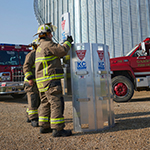Is your fire protection system NFPA compliant?
Inspection, testing and maintenance of water-based fire protection systems.
A fire can be devastating. It can destroy property, interrupt business and cause injury — even death. This is what motivates us to take a proactive view of fire protection and take the necessary steps to prevent or minimize losses caused by fire.
Water-based fire protection systems
Installing a water-based fire protection system is an effective means to suppress accidental fires and reduce fire losses. Systems range from sprinkler to standpipe and hose systems. At the heart of any system is the fire pump, which supplies water at the required flow level and pressure.
The fire pump must be inspected, tested and maintained regularly to ensure fast, effective response in a fire emergency. System failure for any reason could lead to potentially catastrophic losses.
The responsibility for properly maintaining a water-based fire protection system lies with the owners of occupants of the property. These individuals should be familiar with the inspection, testing, and maintenance outlined in the National Fire Protection Association's Fire Pump Code - "Inspection, Testing, And Maintenance of Water-Based Fire Protection Systems" (NFPA 25). The chart below (NFPA 25 - 2020 Edition) outlines these items:
Physical loss or damage to your home and other structures (including debris removal caused directly by flooding/mudflow).Summary of Fire Inspections
| ITEM | FREQUENCY | REFERENCE |
|---|---|---|
| Pump House/Room | Weekly | 8.2.2(1) |
| Pump | Weekly | 8.2.2(2) |
| Electrical System | Weekly | 8.2.2(3) |
| Diesel Engine System | Weekly | 8.2.2(4) |
| Steam Pump System | Weekly | 8.2.2(5) |
Summary of Fire Pump Testing
| ITEM | FREQUENCY | REFERENCE |
|---|---|---|
| Diesel Engine Driven Fire Pump (No Flow) | Weekly | 8.3.1.1 |
| Diesel Fuel | Annually | 8.3.4.1 |
| Electrical Motor Drive Fire Pump (No Flow) | Weekly/Monthly | 8.3.1.2 |
| Pump Operation (No Flow) | Weekly/Monthly | 8.3.2, 8.3.5 |
| Pump Performance (Flow) | Annually | 8.3.3, 8.3.5 |
Summary of Fire Pump Maintenance
| ITEM | FREQUENCY | REFERENCE |
|---|---|---|
| Batteries | Annually | 8.1.1.2.15 |
| Control & Power Wiring Connections | Annually | 8.1.1.2.16 |
| Controller & All Other Components of the Pump Assembly | Per Manufacturer | 8.5 |
| Diesel Active Fuel Maintenance System | Annually or Per Manufacturer | 8.3.4.3 |
| Diesel Engine System | Per Manufacturer | 8.5 |
| Electric Motor & Power System | Per Manufacturer | 8.5 |
| Electrical Connections | Annually | 8.1.1.2.2 |
Consult with qualified professionals for initial testing
Always consult a qualified professional to perform the initial fire pump inspections, tests and maintenance tasks. Follow-up testing may be performed by your in-house maintenance personnel, if they are properly trained by qualified personnel.
Complete weekly inspections
Inspecting your fire pump is among the easiest and quickest ways to identify a problem, such as a leaky pipe. Weekly inspections include, but are not limited to:
- Checking the condition of the pump house, pump system and electrical system. These tasks can be performed by maintenance personnel, once trained.
- Starting and running the pump weekly to ensure proper operation and required pressure and flow — without leaks, unusual noise or vibration
The annual pump test is more complicated and should be performed by a qualified fire pump testing professional
Conduct preventive maintenance
Preventive maintenance is the key to a successful maintenance program and a properly functioning fire protection system. Through preventive maintenance, every component of your fire protection system is inspected, repaired and maintained in such a way that prevents failures.
Always maintain written documentation on all work performed on the pump, driver, controller and auxiliary equipment. Written records not only verify that a proper maintenance schedule has been followed, but help shed light on any problem areas.
It’s your business, and a loss due to a malfunctioning fire pump can be catastrophic. Nobody knows when a fire will happen, but you can take measures to reduce the potential damage. An effective fire pump maintenance program that includes written procedures, recorded test results, documentation of inspections and maintenance procedures, and effective communication with the proper personnel can help minimize the likelihood that you’ll experience a loss due to a malfunctioning fire pump.

 >
>

 >
>
 >
>